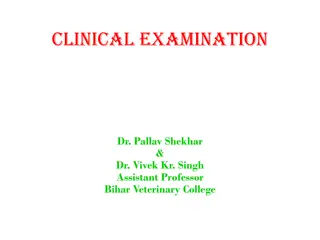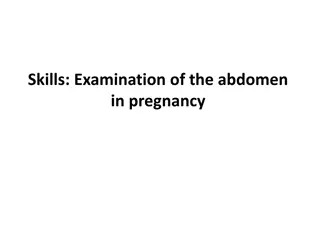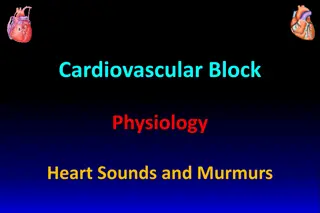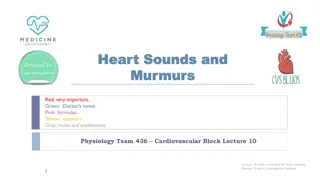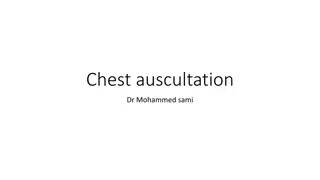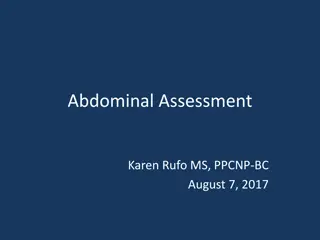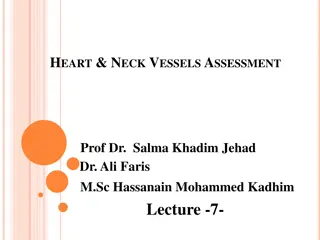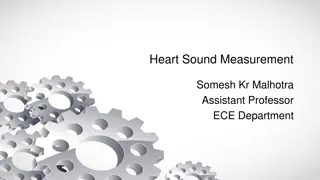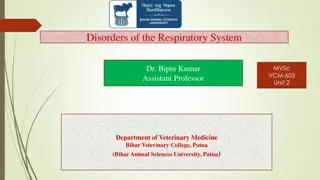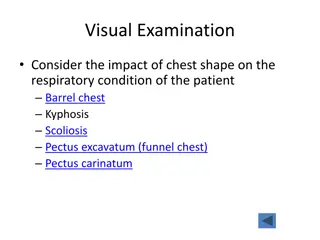Veterinary Clinical Examination Techniques and Procedures
Learn about the essential veterinary clinical examination techniques including distant examination (inspection), physical examination (palpation, percussion), auscultation, and more. Understand the importance of visual observation, hands-on assessment, and listening to internal organ sounds in diagn
5 views • 24 slides
Abdominal Examination in Pregnancy: Techniques and Objectives
Examination of the abdomen in pregnancy involves assessing various aspects such as determining gestational age, measuring symphysis-fundus height, evaluating fetal lie and presentation, checking liquor amount, listening to fetal heart sounds, and monitoring fetal movements. The process includes gene
0 views • 38 slides
Understanding Cardiac Auscultation: Heart Sounds and Murmurs
Delve into the intricacies of cardiac auscultation with a focus on heart sounds and murmurs. Learn about stethoscope placement, heart sound differentiation, physiological splitting, cardiac murmur classification, and hemodynamic changes in various heart conditions. Explore essential learning outcome
0 views • 43 slides
Understanding Heart Sounds and Murmurs in Cardiovascular Physiology
This detailed lecture covers the basics of normal and abnormal heart sounds, stethoscope placement, cardiac auscultation, and the physiological significance of heart murmurs. It explains the causes, descriptions, and grading of abnormal heart sounds, along with specific conditions like aortic stenos
0 views • 26 slides
Understanding Lung Sounds and Auscultation Techniques
Exploring the world of chest auscultation with Dr. Mohammed Sami, this guide provides insights into how to listen to lung sounds, where to listen, what to listen for, and the use of a stethoscope. Learn about different lung areas, sound characteristics, airflow patterns, and the mechanics behind bre
0 views • 34 slides
Comprehensive Guide to Abdominal Assessment Methods
Learn the critical order of examination for abdominal assessment, including inspection, auscultation, percussion, and palpation. Understand how to assess skin characteristics, symmetry, abdominal muscles, bowel sounds, vascular sounds, organ size, and tenderness. Discover techniques to identify abno
0 views • 72 slides
Heart and Neck Vessels Assessment Overview
This information presents a comprehensive guide for heart and neck vessels assessment, including objectives, necessary equipment, preparation steps, subjective data to consider, techniques for palpating and auscultating the carotid artery, normal findings, and more. It emphasizes the importance of s
0 views • 23 slides
Understanding Heart Sound Measurement in Cardiac Auscultation
Heart sound measurement plays a crucial role in cardiac auscultation. This process involves listening to the four basic heart sounds produced by various mechanisms in the heart, such as valve closure, abnormal valve opening, ventricular chamber vibrations, chordae tendineae tension, and turbulent bl
0 views • 5 slides
Veterinary Guide: Respiratory System Disorders in Horses
Respiratory system disorders in horses are crucial as they can impact the animals' performance and lead to economic losses for owners. Early detection and treatment are essential for ensuring the rapid return of athleticism in performance animals. This guide covers the diagnostic approach to respira
0 views • 9 slides
Comprehensive Visual and Physical Assessment Techniques for Respiratory Conditions
This comprehensive guide covers the visual, palpation, auscultation, percussion, and pathological processes involved in assessing respiratory conditions. It discusses the impact of chest shape variations like barrel chest, kyphosis, scoliosis, pectus excavatum, and pectus carinatum on respiratory he
0 views • 6 slides
